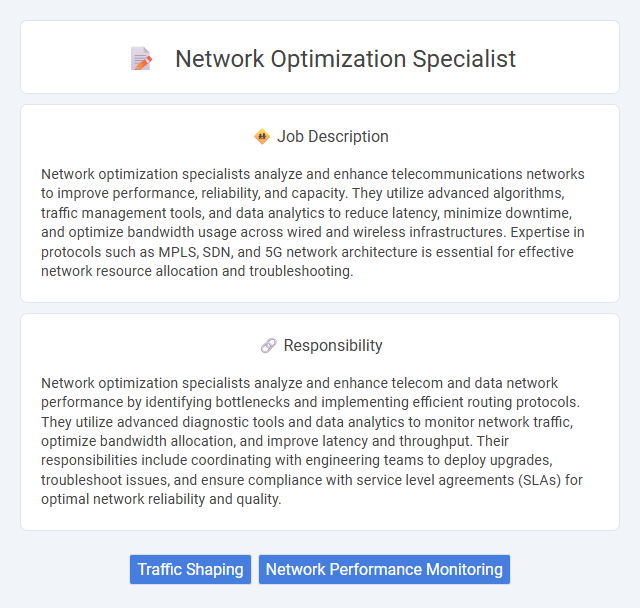
Network optimization specialists analyze and enhance telecommunications networks to improve performance, reliability, and capacity. They utilize advanced algorithms, traffic management tools, and data analytics to reduce latency, minimize downtime, and optimize bandwidth usage across wired and wireless infrastructures. Expertise in protocols such as MPLS, SDN, and 5G network architecture is essential for effective network resource allocation and troubleshooting.
Individuals who possess strong analytical skills and a passion for technology are likely to thrive as network optimization specialists. Those comfortable with problem-solving in dynamic environments and able to work under pressure may find this role particularly suitable. Candidates who prefer routine tasks or have limited technical knowledge might struggle to meet the demands of this position.
Qualification
A Network Optimization Specialist requires in-depth knowledge of networking protocols, traffic analysis, and performance tuning with qualifications including a degree in Computer Science or Information Technology and certifications such as Cisco CCNP or Juniper JNCIS. Proficiency in tools like Wireshark, SolarWinds, and network simulation software is essential for diagnosing and resolving network inefficiencies. Strong analytical skills and experience in optimizing WAN, LAN, and cloud network infrastructures are crucial for improving overall system reliability and speed.
Responsibility
Network optimization specialists analyze and enhance telecom and data network performance by identifying bottlenecks and implementing efficient routing protocols. They utilize advanced diagnostic tools and data analytics to monitor network traffic, optimize bandwidth allocation, and improve latency and throughput. Their responsibilities include coordinating with engineering teams to deploy upgrades, troubleshoot issues, and ensure compliance with service level agreements (SLAs) for optimal network reliability and quality.
Benefit
Network optimization specialists likely improve system efficiency and reduce operational costs by fine-tuning network performance. Increased reliability and faster data transmission may enhance overall user experience and support business continuity. Companies could see a higher return on investment as network resources are used more effectively.
Challenge
Network optimization specialist roles likely involve tackling complex challenges such as minimizing network latency and maximizing bandwidth efficiency. The position probably requires diagnosing intermittent connectivity issues and implementing predictive models to prevent network congestion. Success in this job often depends on balancing cost constraints with performance improvement goals in evolving network infrastructures.
Career Advancement
Network optimization specialists enhance telecommunications systems by analyzing performance data and implementing improvements to increase efficiency and reduce costs. Career advancement typically involves gaining expertise in advanced technologies such as 5G, AI-driven network analytics, and cloud-based systems, leading to roles like senior network architect or network operations manager. Certifications from vendors like Cisco and Juniper, along with experience in network security and project management, significantly boost promotion prospects within this field.
Key Terms
Traffic Shaping
Network optimization specialists enhance data flow and efficiency by implementing traffic shaping techniques that prioritize bandwidth allocation and reduce latency. Their expertise in analyzing network usage patterns allows for dynamic adjustment of traffic routes and congestion management, ensuring optimal performance of enterprise networks. Proficiency with tools such as Cisco QoS, NetFlow, and SD-WAN solutions is essential for effective traffic shaping and sustained network reliability.
Network Performance Monitoring
Network optimization specialists leverage advanced network performance monitoring tools to analyze traffic patterns, identify bottlenecks, and optimize bandwidth utilization. They utilize real-time data analytics and machine learning algorithms to proactively detect latency issues and packet loss, ensuring high availability and minimal downtime. Expertise in SNMP, NetFlow, and network diagnostic protocols enables swift troubleshooting and continuous improvement of network infrastructure efficiency.
 kuljobs.com
kuljobs.com